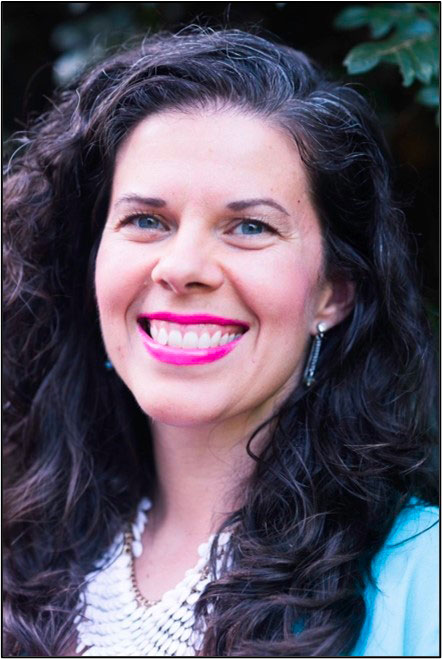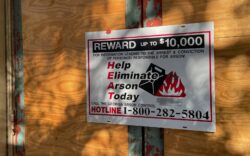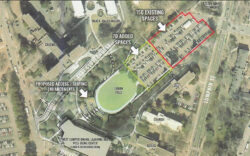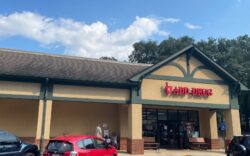In Northeast Georgia, 91,000 people don’t know where their next meal is coming from, and one-third of them are children. The Food Bank of Northeast Georgia has a mission to assure that every neighbor has enough food every day. Who is a neighbor? Anyone needing help.
With 35 full-time employees, the nonprofit procures, stores and distributes food throughout 15 counties in Northeast Georgia, with one distribution center in Athens and one in Clayton. Lots of food: in 2024, that was 15.5 million pounds of nutritious food, 50% of it fresh or frozen. This year, that figure is trending 10% higher; in the first three months of 2025, 30% more people received food assistance than in 2024, according to food bank officials.
To better serve those in need, the Food Bank of Northeast Georgia has increased its capacity. Last July, officials held a grand opening for a new, massive $15 million facility on Newton Bridge Road. You can easily fit a football field inside it and have room left over for concession stands. The 63,000-square-foot building provides more storage capacity for cold and frozen food, better distribution logistics, and more ways for people to volunteer. Inside the warehouse area, forklift drivers retrieve pallets of food—maybe peanut butter, beans or flour—and whisk them out to trucks on the loading dock. It also more than doubles the opportunities for volunteers, increasing from 30 to 75.
On July 12, Congress passed President Trump’s massive tax and spending bill, which cuts funding for the Supplemental Nutrition Assistance Program (SNAP), relied on by more than 1 million Georgia residents. Food Bank of Northeast Georgia officials estimate that 40% of those who receive their food are also enrolled in SNAP. Without federal assistance, it’s likely more people will be relying on the Food Bank of Northeast Georgia.
The food bank partners with 230 agencies in the 15 counties—churches, recovery centers, recreation centers, mobile pantries and other nonprofits—to get food to those who need it. President and CEO Erin Barger recently spoke to Flagpole about the nonprofit and its work.

Flagpole: Do you know how many people who rely on the Food Bank of NEGA receive SNAP? Erin Barger: Based upon our recent Neighbor Survey across our 15-county region, we understand that SNAP benefits are used by only 40% of those who responded to the survey earlier this year. While it is sometimes believed that SNAP benefits are too easy to receive and easily abused, it is our experience that SNAP enrollment can be very difficult, and both this and re-certification imply that we have a wide gap that exists between who are eligible to receive SNAP and the number of individuals actually enrolled in the program.
FP: Do you have any idea how much demand for food will rise once Trump’s bill goes into effect?
EB: We are experiencing a 10–15% increase in demand so far this year. While we cannot estimate with exactitude how this will continue to evolve, we anticipate that any cuts to SNAP and associated programs will only exacerbate this trend. It is our experience that more neighbors are food insecure than we have seen before, including during the pandemic, and the severity of the need is also greater than any time we can remember.
FP: Do you think the Northeast Georgia community will step up to fill any gaps that the Food Bank experiences?
EB: It is our experience that the philanthropy, or love of humankind, in this region is heroic. The generosity in sharing resources, time and wisdom of our supporters has helped make the Food Bank of Northeast Georgia what it is today. However, no level of private philanthropy can be expected to meet the shortfall that would be created by SNAP benefits completely disappearing—we trust that our state level elected officials will be ready to meet this challenge with sound mind and care for those in our community who, as humans, must have access to food in order to survive. In other words, we must find a way to afford it, because our neighbors can’t live without it. We believe food is essential, and what is essential cannot be negotiable.
FP: I read that some food banks plan to give less food to people, in order to make what food they receive stretch farther. Do you expect to have to do that?
EB: Our engagement so far has been able to meet neighbors where they are in terms of level of need. We plan to continue to do so as much as possible and expect to finish this year mobilizing more than 15 million pounds of food, just as we did last year, which was record breaking for us.
FP: How can Athens best support the Food Bank and its mission?
EB: By getting involved. Volunteer, become a Fork Lifter [monthly donor], advocacy partner and champion for this work. We are fully confident that the people of this region will continue to show up for our neighbors. I do believe that lives depend on it.
Like what you just read? Support Flagpole by making a donation today. Every dollar you give helps fund our ongoing mission to provide Athens with quality, independent journalism.










